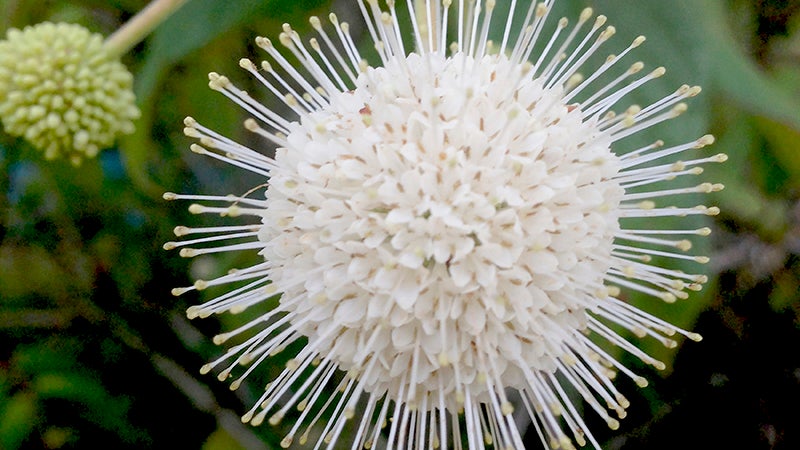Arboretum’s spring native plant sale this Friday and Saturday
Published 7:07 am Wednesday, March 13, 2019

- Cephalanthus occidentalis 2013 June (9) net
By Patricia R. Drackett, Director and Assistant Extension Professor of Landscape Architecture
The Crosby Arboretum, Mississippi State University Extension Service
The last few weeks have found the Arboretum staff and volunteers in a flurry of activity preparing for our big spring native plant sale this Friday and Saturday, March 15 and 16.
Many unusual, hard-to-find native plants will be available at the sale, including native honeysuckle azaleas (pink, yellow, and white), catalpa and mayhaw trees, Grancy Graybeard, otherwise known as native fringe tree, oakleaf hydrangea, several species of native iris, milkweed, purple coneflower, red buckeye, and pawpaw trees. Whatever you fancy, you are sure to find something here that will not be a run-of-the-mill addition to your home landscape!
Why should you consider adding native plants to your home landscape? One common response is because they can save you time and money! Native species are adapted to our local soils and climate, and if properly located, are incredibly durable and drought-tolerant. Because of this, they do not require large amounts of chemicals – pesticides and fertilizers – to maintain them. And by planting native plants, you can also save money and labor by not having to replace them as you may need to do with exotic species that may not be suited to our Mississippi climate.
By reducing or eliminating the use of pesticides and fertilizers, you can improve the health of your local watershed. And finally, planting native species plants can also improve the biodiversity of your neighborhood, meaning that the plants will support local wildlife.
Mississippi’s native plant species can certainly add some flare to your garden. The white strap-like spring blooms of Grancy graybeard (Chionanthus virginicus) are guaranteed to steal the show when used as a specimen or accent tree. This plant is also known as fringetree. Like its relative, the familiar fragrant sweet olive, fringetree is in the Olive family, and like the sweet olive, it has deliciously scented blooms. If you have both plants, you will recognize the similarity in the fragrance.
Although it will grow in full sun, Grancy graybeard seems to appreciate a little high shade. It prefers moist, well-drained sites, but tolerates drier areas as well. This is a good thing for the home gardener, when a plant can be happy in a range of site conditions.
Oakleaf hydrangea (Hydrangea quercifolia) is a deciduous shrub found in moist, well-drained areas in the forest understory, and it will thrive if provided with these same conditions in your garden. Although it loses its leaves in winter, this shrub still has four seasons of landscape interest. In the winter, the sculptural branches create drama in the landscape, and the peeling bark adds to its beauty.
Locate oakleaf hydrangea in the back of a bed to provide some cover for the bare branches in winter. Locate shorter species with winter interest in the front, such as a mass of evergreen ferns. In spring, unfurling oak-like leaves will mature, and the shrub develops spectacular blooms, with coarse texture and long-lasting bloom heads that persist well into summer. Finally, in fall, the leaves of this shrub turn spectacular shades of burgundy and maroon.
On plant sale days, site admission is free, so if you have always wondered what we are all about, please consider this event an invitation to pay us a visit.
On Saturday, March 15, enjoy an opening event for the Arboretum’s spring gallery exhibit of photography by Rhonda Lewis. Admission is free, and the event will begin with a short, informal talk by Rhonda on the inspiration for her photography, as well as her subjects and techniques. Following the presentation, light refreshments will be served in the gallery. Rhonda’s exhibit will be on display through May 31.
A Flower Planting Workshop will be held Saturday, March 23 from 11:00 to noon. “Ms. Flora” (Master Gardener Amy Nichols) will read a story and talk about the parts of a flower. Then, children will plant sunflower seeds and make mini-greenhouses. Members’ children $2; non-members’ children $4.
An instructional workshop on Mississippi’s Venomous Snakes will be offered Saturday, March 23 from 1:30 to 2:30 by Kim Johnson. Live snakes will not be used. The program will feature lifelike snake replicas to teach about the various venomous species. Members’ children $1; non-members’ children $3.
Children in these programs must be accompanied by an adult. Reservations are requested. Please call 601-799-2311 to sign up. No charge for adults. The Crosby Arboretum is located at 370 Ridge Road in Picayune, at I-59 Exit 4, and is open Wednesday through Sunday from 9 to 4. Leashed pets are welcome.



